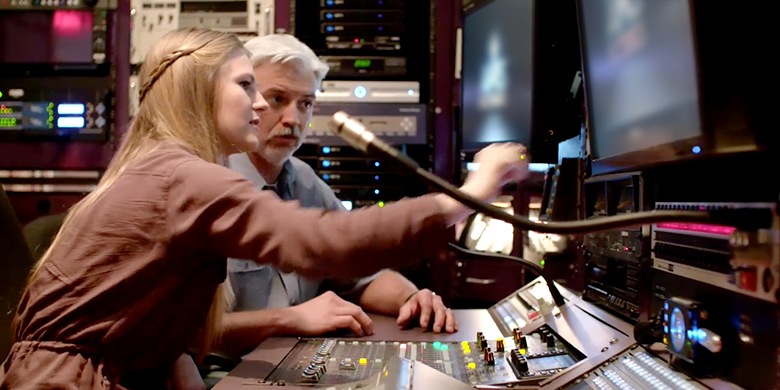Last updated on October 10, 2019
Skilled video technicians can easily take advantage of high demand in the video production, television broadcast and film industries. Thankfully, our associate degree and certificate programs provide a solid foundation to enter the video production or television broadcast arena.
Become a Video Production Major at North Lake College
North Lake offers three degree and certificate programs in Video Technology:
- The Video Technology Associate in Applied Sciences Degree, a two-year (for full-time students) program with videography classes in areas like TV studio and field production, audio production, graphics, lighting and more. Students will also learn about the business aspects of the industry — so you can have an idea of what to expect as a working professional videographer.
- The Animation and Visual Effects Certificate, which consists of a minimum of 29 credit hours specializing in 3D modeling and rendering, animation, digital video skills, visual effects and computer graphics.
- The Audio Visual Specialist Certificate, which consists of a minimum of 28 credit hours of specialization in TV studio production, film and video editing, video graphics and television lighting.
What is Video Technology?
There’s a lot more to Video Technology than simply pointing a camera and pressing record. “We are preparing students for a career in video production,” said Tim Dougherty, a North Lake Video Technology professor. “That includes all types of production jobs, such as script writing, camera, audio, lighting, graphics and technical directing.”
Apply for Admission to DCCCD Today
What Does a Video Production Team Consist Of?
Creating a full-scale piece of multimedia video production involves a lot of steps. Typically, a video production team has one director leading the team, one or more producers, and a full technical crew ranging in specialties. These specialties can include scriptwriting, wardrobe design, stage lighting, sound, stage set-up and more. And that’s not all by a long shot! The number of people on the team can vary depending on the scope of the project. On bigger productions, the crew will tend to have very specialized and specific roles. On a smaller production, the roles may have more of a tendency to overlap, and workers may wear multiple hats to get the job done.
Once the “raw” footage is collected, you then need editors to piece each aspect together. At this stage, you may also need workers who specialize in computer graphics, including 3D rendering and animation. If there will be music involved, audio producers also become more involved at this stage. Often, video editing involves the work of people who specialize in what’s called nonlinear editing. Basically, they can take footage that has been filmed out of order or at different times to create a finished piece.
How Does Video Editing Work?
Commonly used video editing software includes products like Final Cut Pro or Adobe Premiere. At North Lake, instructors use Blackmagic Design’s DaVinci Resolve software to make the editing magic happen. Students learn various styles of editing and concepts, as well as the technical details like video exporting/sharing, file organization, transform tools, animation and motion graphics.
As Video Technology majors, students learn how to produce high quality video works like commercials and music videos. Throughout their education, they also develop transferable skills to apply to other things. These things might include broadcast news production, movie production, documentaries, presentations and more.
Is Video Production a Good Career Choice?
Why study video production? Here’s why: According to the U.S. Bureau of Labor Statistics, videography jobs in the broadcast and audio engineering industry will grow by seven percent over the next 10 years, and the median pay is almost $42,000 per year. In the Dallas-Fort Worth region, salaries are slightly higher, about $44,600 per year.
In addition, the BLS data show that jobs for camera operators and video editors will grow by more than 11 percent in the next decade, a faster rate than average; the median pay in those careers is almost $27 per hour. In North Texas, those jobs pay almost $60,000 per year.
- Find out more about DCCCD’s certificate and degree programs on our website.
